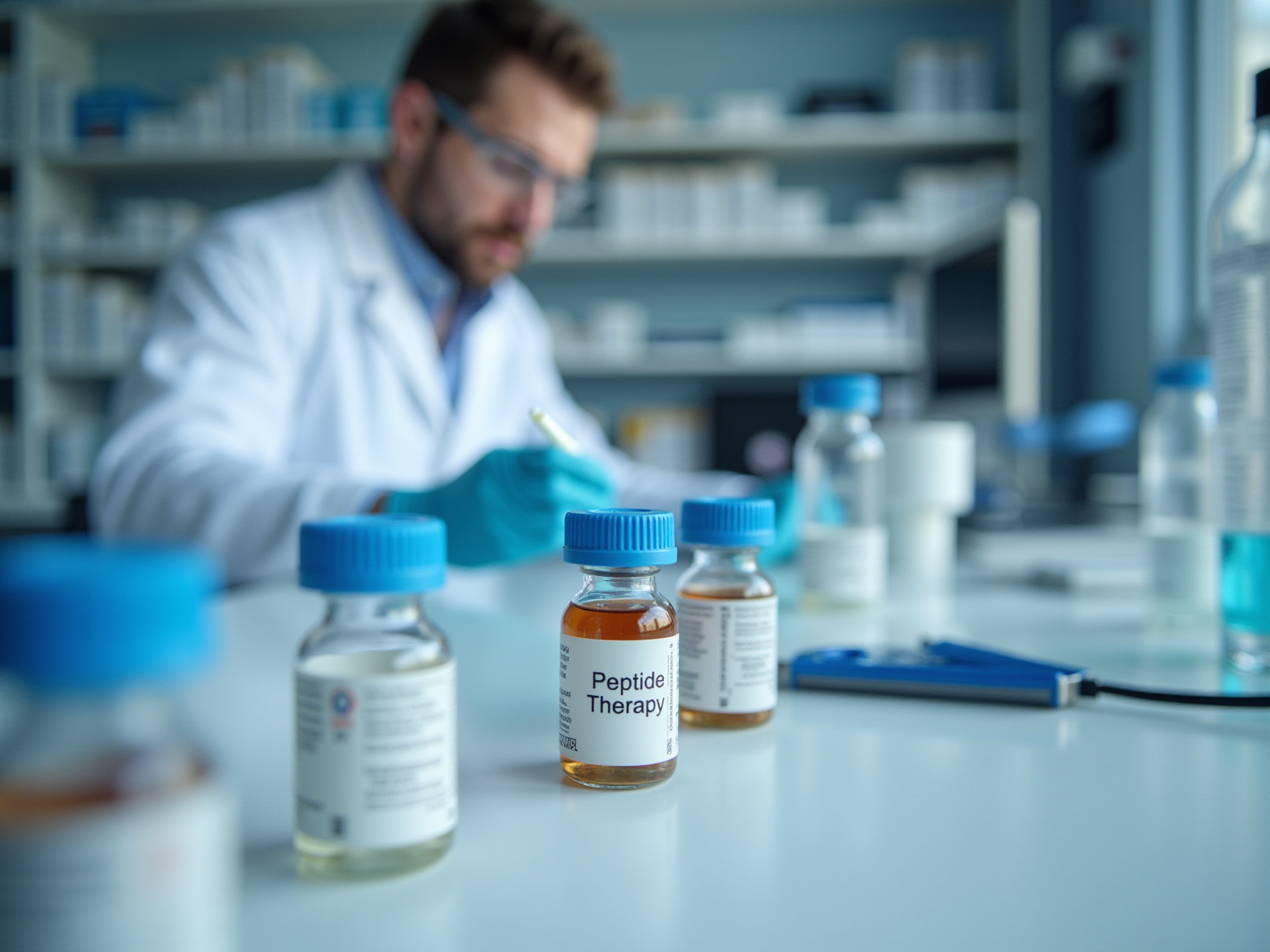Understanding Peptide Therapy Side Effects for Informed Choices
Overview
Peptide therapy can lead to side effects, such as:
- Injection site reactions
- Gastrointestinal issues
- Hormonal fluctuations
These effects can vary based on the specific peptide used and the delivery method. Understanding these potential side effects is crucial for patients. It enables informed discussions with healthcare providers, ultimately enhancing treatment safety and effectiveness. Are you aware of the implications of these side effects? Engaging in dialogue with your healthcare team can help you navigate your treatment journey more effectively.
Introduction
In the realm of modern medicine, peptides are emerging as powerful therapeutic agents, capturing the attention of both researchers and patients alike. These short chains of amino acids play a crucial role in various biological processes, acting as signaling molecules that can influence a range of physiological functions. As the landscape of healthcare evolves, peptide therapy is gaining traction for its potential to offer targeted treatments with fewer side effects compared to traditional medications.
This article delves into the multifaceted world of peptide therapy, exploring its distinct advantages, common side effects, and essential considerations for patients seeking to harness its benefits. With a growing body of research and innovative techniques enhancing peptide efficacy, the future of this therapeutic approach appears promising, paving the way for more personalized and effective healthcare solutions.
Define Peptides and Their Role in Therapy
Short chains of amino acids, typically ranging from 2 to 50, are connected by bonds. These molecules are integral to numerous biological processes, functioning primarily as signaling agents that regulate various physiological functions. In therapeutic contexts, they are utilized for their ability to mimic or modify the functions of hormones and other biological agents, making them crucial in addressing conditions such as metabolic disorders and age-related issues. Their intrinsic specificity allows for targeted treatments, potentially leading to improved outcomes and reduced side effects, including peptide therapy side effects, compared to traditional medications.
Recent advancements in protein research highlight their evolving role in treatment. For instance, the market for these drugs is projected to grow significantly, particularly with the introduction of orally bioavailable compounds that offer enhanced convenience for patients. This trend suggests that health-conscious individuals may soon have more accessible options for protein therapies. Furthermore, innovative methods like halogenation are being explored to boost protein bioactivity, enhancing cell membrane permeability and specificity while minimizing aggregation risks.
As our understanding of these signaling molecules deepens, their therapeutic applications are expected to expand, paving the way for more effective and tailored treatment options. However, as noted by Marie Lorraine Johnson, MS, RD, CPT, ‘Currently, there is still limited evidence to indicate that these products are effective, and much more research is necessary to thoroughly assess their efficacy, safety, and peptide therapy side effects.’ This perspective underscores the importance of ongoing research in this field.
For readers seeking a deeper understanding of protein modifications and delivery systems, a glossary is available to clarify relevant terminology.
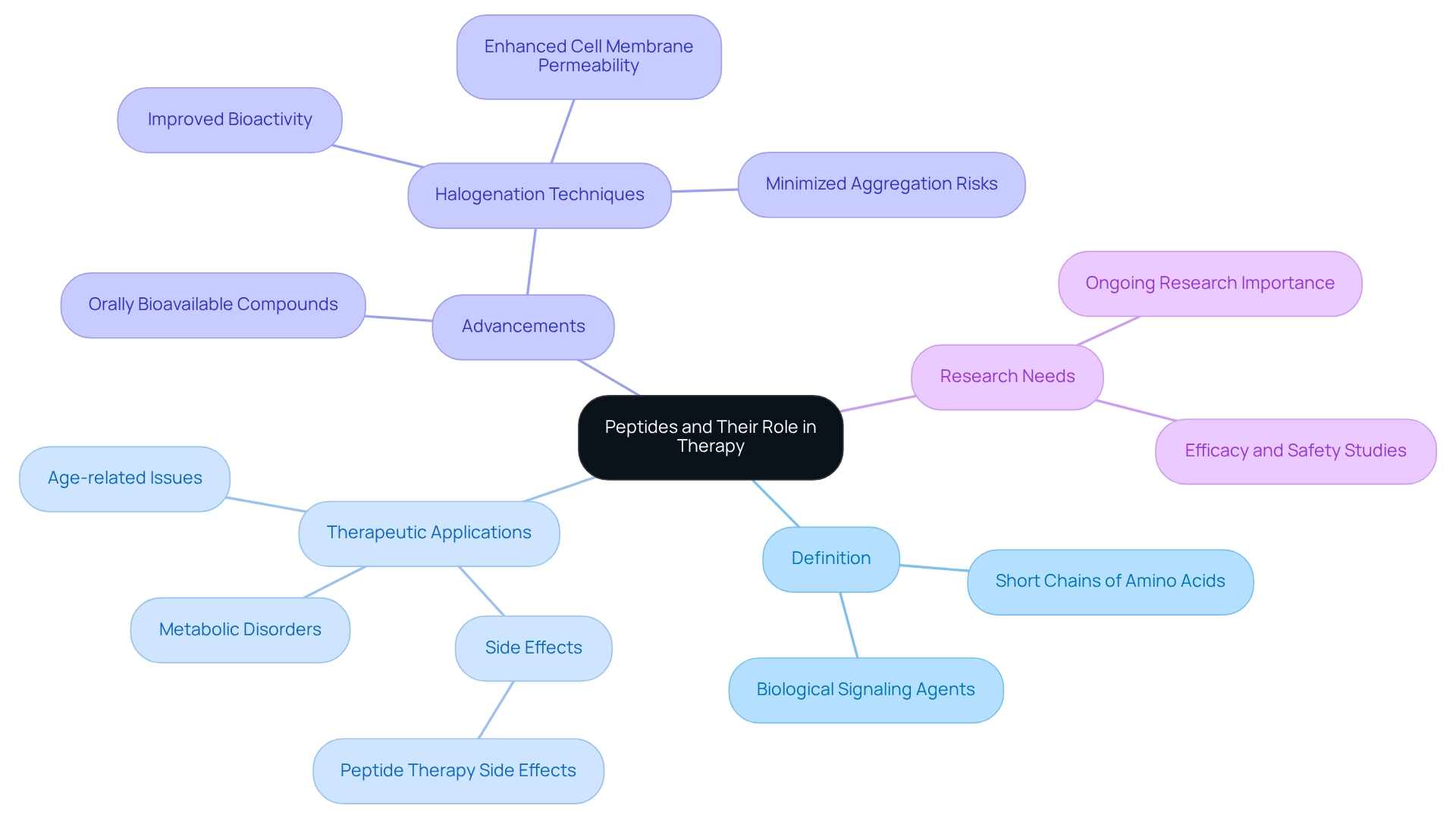
Differentiate Peptide Therapy from Traditional Treatments
Peptide treatment stands apart from traditional methods primarily due to its distinct mechanism of action and specificity. Conventional medications often target various pathways, leading to a range of side effects. In contrast, peptide treatment is designed to engage specific receptors within the body, promoting more targeted therapeutic outcomes. This distinction is particularly important in anti-aging strategies, where quality nutrition and innovative treatments are crucial.
For instance, while conventional hormone replacement therapies may involve direct hormone administration, peptide treatment encourages the body’s natural hormone production. This approach can yield more balanced and natural results. The specificity of peptide treatment not only reduces the likelihood of peptide therapy side effects but also diminishes the risk of complications, making it an appealing option for many patients. Furthermore, the inclusion of dietary supplements, such as rapamycin, which has shown promise in extending lifespan and enhancing healthspan, underscores the importance of targeted strategies in anti-aging treatments. As a result, individuals seeking effective anti-aging solutions may find that peptide treatment offers a compelling alternative to traditional methods.
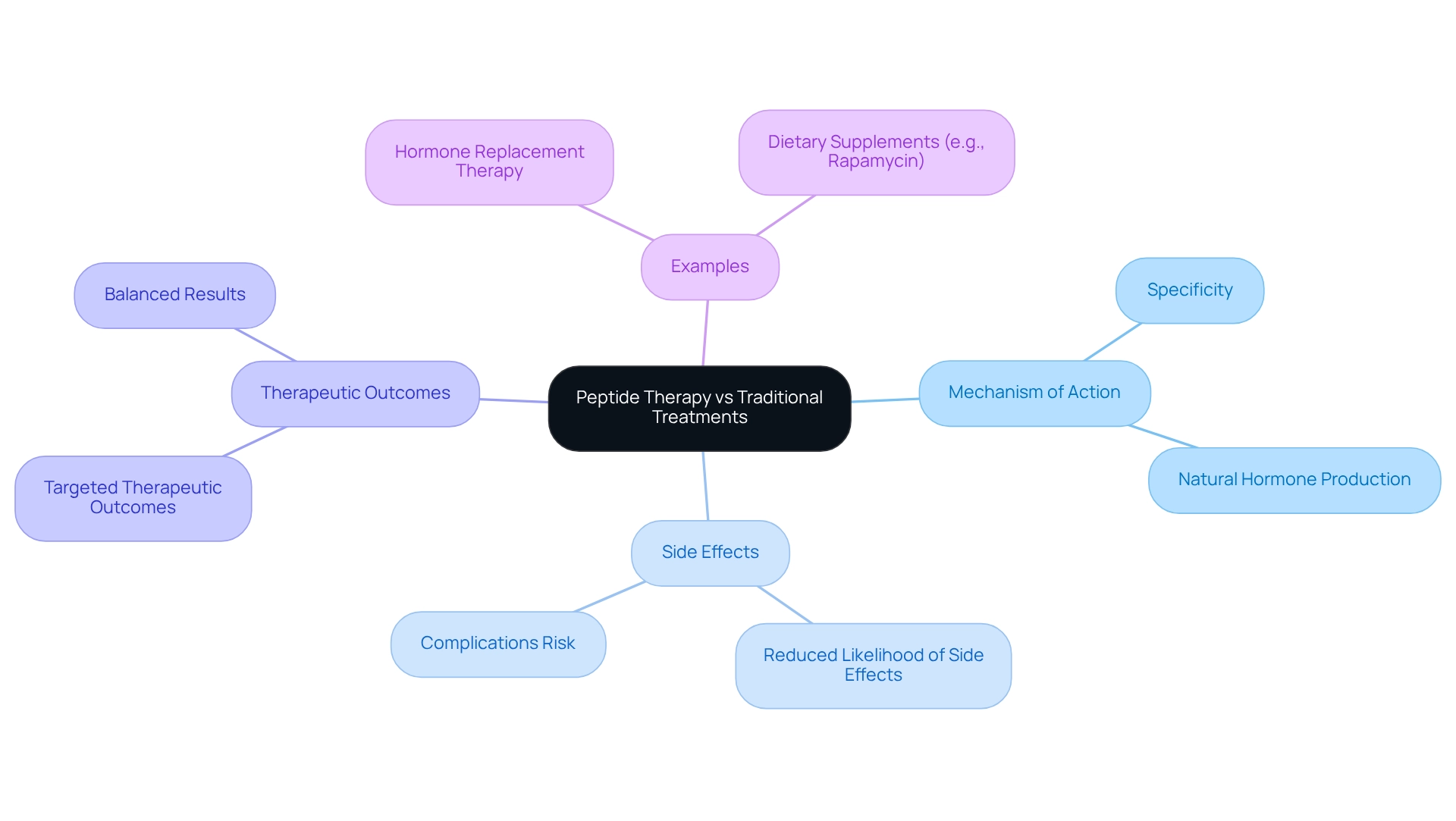
Identify Common Side Effects of Peptide Therapy
Typical reactions to peptide therapy side effects can differ depending on the particular peptide and method of delivery. Commonly reported reactions, which are considered peptide therapy side effects, include:
- Injection Site Reactions: Patients often experience mild swelling, redness, or tenderness at the injection location. Recent studies suggest that injection site reactions are among the most common adverse reactions related to peptide therapy side effects, with approximately 30% of patients reporting mild discomfort. These reactions are usually temporary but can differ in intensity, with gastrointestinal issues like nausea, diarrhea, and digestive discomfort being common as peptide therapy side effects, especially with certain compounds.
- Monitoring these symptoms is vital for managing overall well-being, particularly in relation to peptide therapy side effects such as fatigue or drowsiness, allergic reactions, hormonal fluctuations, and serious reactions that require immediate medical attention.
- Possible consequences of human growth hormone treatment, especially in anti-aging applications, involve joint discomfort, swelling, insulin resistance, and a heightened risk of diabetes. Long-term use may also be associated with an increased risk of certain cancers.
- Comprehending these possible responses is crucial for patients to efficiently track their reactions and participate in knowledgeable conversations with their healthcare providers. By being aware of the peptide therapy side effects, patients can make informed choices and improve their overall experience with this treatment.
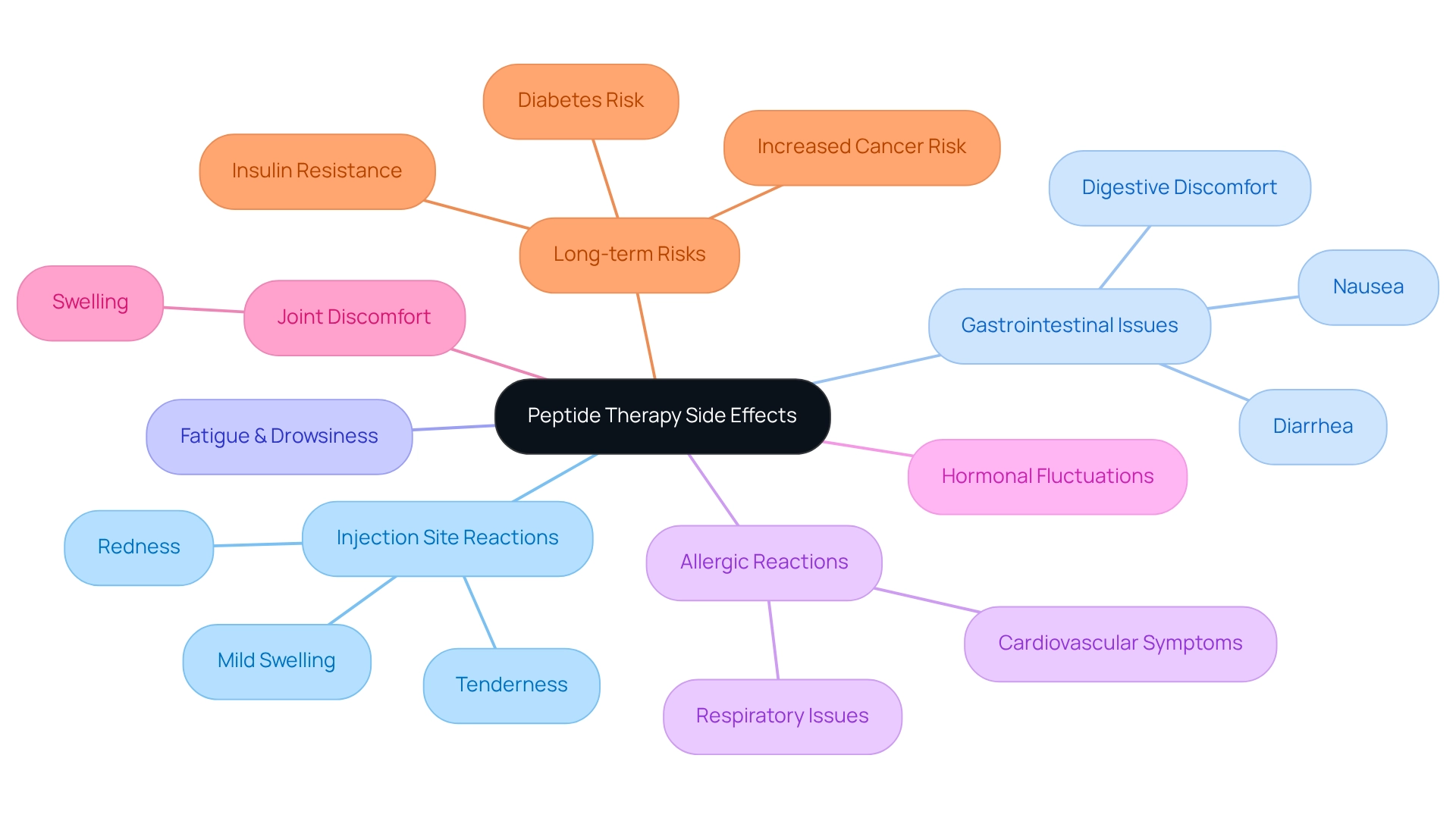
Discuss Patient Considerations and Safety Protocols
When considering peptide therapy, patients should take several critical factors into account to ensure both safety and efficacy.
-
Consultation with a Qualified Provider: Engaging with a healthcare professional who specializes in peptide therapy is essential. This ensures that the choice of proteins and dosages is customized to individual health requirements, enhancing therapeutic results. Statistics indicate that patients who consult qualified providers are more likely to experience positive health outcomes, underscoring the importance of professional guidance.
-
Thorough Medical History Review: It is vital for patients to provide a comprehensive medical history, including allergies and pre-existing conditions. This transparency helps prevent adverse reactions and ensures a safer treatment plan.
-
Monitoring and Follow-Up: Regular follow-up appointments are essential for evaluating the treatment’s results and making necessary dosage adjustments. A case study on cognitive function improvement through protein-based treatment highlights the advantages of ongoing assessment, demonstrating that continuous monitoring can greatly enhance treatment effectiveness and patient safety.
Patients ought to be well-informed about the possible peptide therapy side effects related to protein treatment. Prompt reporting of any unusual symptoms is encouraged to address issues before they escalate. Notably, the study’s limitations regarding the analysis of peptide therapy side effects emphasize the need for vigilance in monitoring these side effects.
- Lifestyle Considerations: Combining protein treatment with a healthy lifestyle—encompassing balanced nutrition and regular exercise—can enhance its advantages and diminish associated risks. As Patrick P. Gleason, PharmD, BCPS, notes, “Value from these products may be obtained through reductions in obesity complications, such as developing diabetes, cardiovascular events, and sleep apnea.”
By adhering to these considerations and established safety protocols, patients can maximize the advantages of peptide therapy while minimizing potential risks. This approach aligns with expert recommendations emphasizing the importance of informed patient-provider interactions in achieving optimal health outcomes.
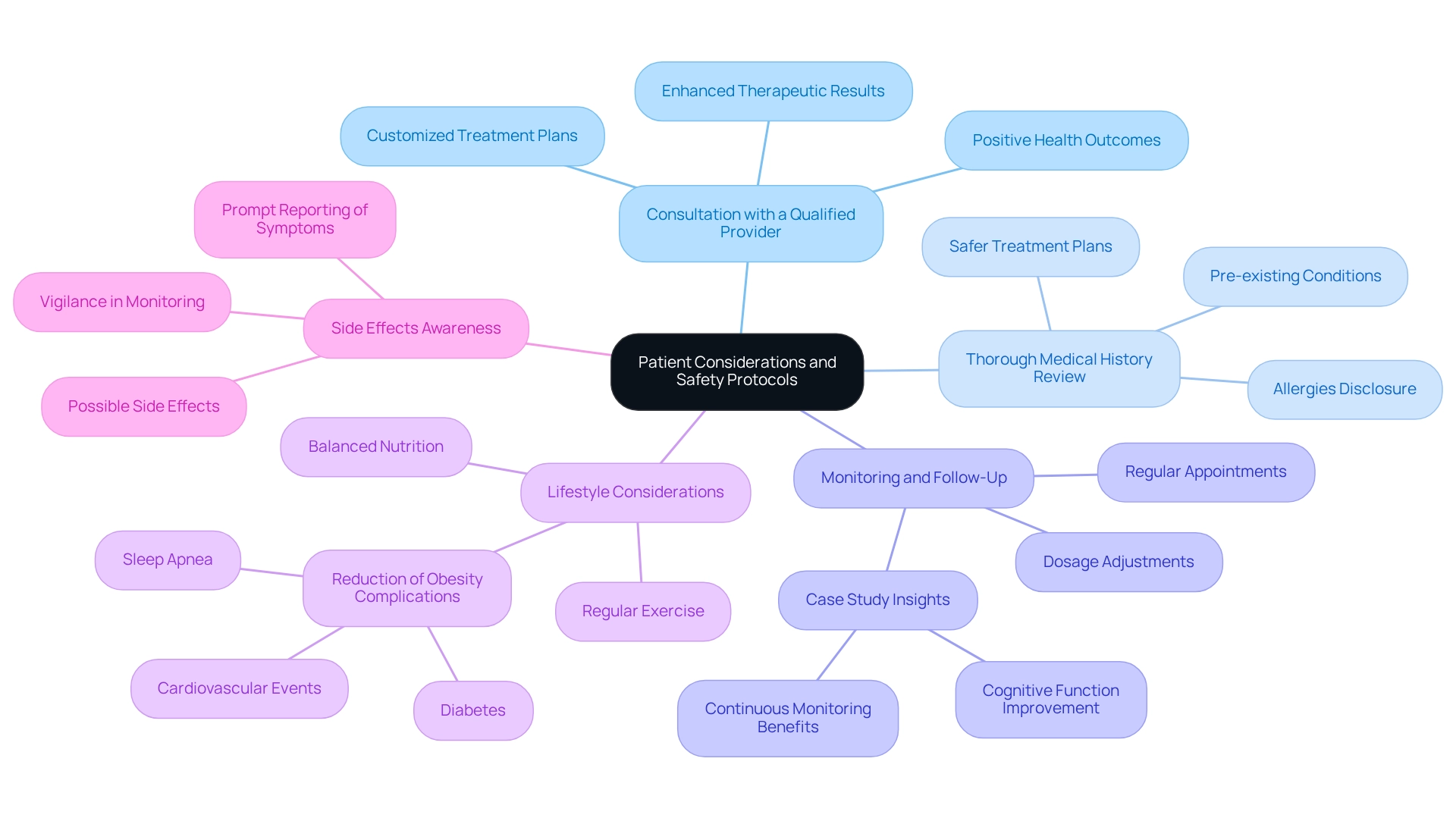
Conclusion
Peptide therapy represents a significant advancement in modern medicine, offering targeted treatment options that may lead to improved efficacy and reduced side effects compared to traditional therapies. By understanding the unique role of peptides as signaling molecules, patients and healthcare providers can leverage their benefits for various health conditions, including metabolic disorders and age-related issues. The specificity of peptide therapy allows for a more personalized approach to treatment, promoting the body’s natural processes rather than simply replacing hormones.
However, it is essential to approach peptide therapy with caution. Awareness of potential side effects, including injection site reactions, gastrointestinal issues, and hormonal fluctuations, is crucial for effective management and overall well-being. Engaging with qualified healthcare professionals and maintaining open communication about any adverse effects can significantly enhance the treatment experience.
Ultimately, as research continues to evolve and the peptide drug market expands, the future of peptide therapy looks promising. By integrating this innovative approach with a healthy lifestyle and thorough medical oversight, patients can unlock the full potential of peptide therapies, paving the way for more effective and personalized healthcare solutions. The journey towards optimal health is increasingly tailored, and peptide therapy stands at the forefront of this transformation.
Frequently Asked Questions
What are peptides and their primary functions in biological processes?
Peptides are short chains of amino acids, typically ranging from 2 to 50, that are connected by bonds. They function primarily as signaling agents that regulate various physiological functions.
How are peptides used in therapeutic contexts?
In therapeutic contexts, peptides are utilized for their ability to mimic or modify the functions of hormones and other biological agents, making them crucial in addressing conditions such as metabolic disorders and age-related issues.
What advantages do peptides offer compared to traditional medications?
Peptides offer intrinsic specificity for targeted treatments, potentially leading to improved outcomes and reduced side effects compared to traditional medications.
What recent advancements have been made in peptide research?
Recent advancements include the projected growth of the market for peptide drugs, particularly with the introduction of orally bioavailable compounds that enhance convenience for patients, and innovative methods like halogenation to boost protein bioactivity.
What is the significance of ongoing research in peptide therapy?
Ongoing research is essential as there is still limited evidence regarding the effectiveness of peptide products, and much more research is necessary to thoroughly assess their efficacy, safety, and potential side effects.
Is there a resource available for understanding peptide-related terminology?
Yes, a glossary is available for readers seeking a deeper understanding of protein modifications and delivery systems, clarifying relevant terminology.
